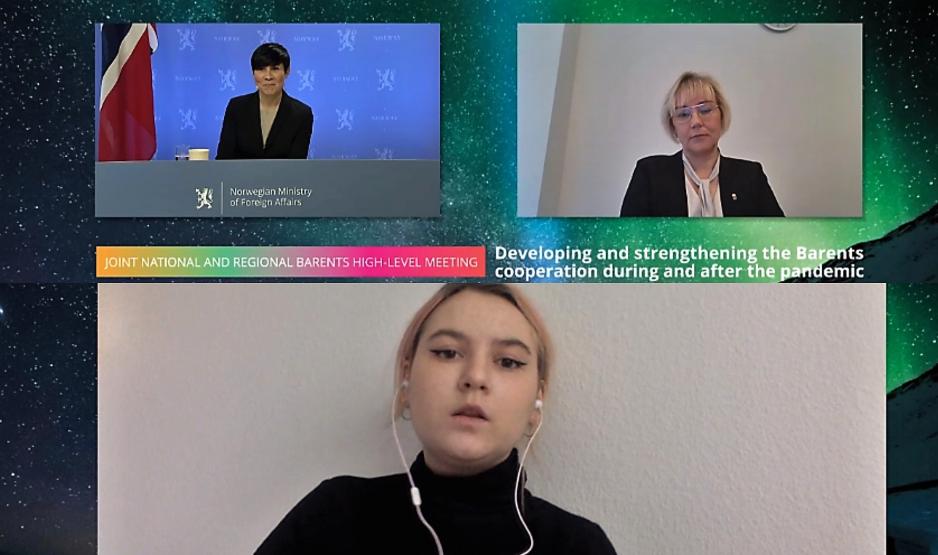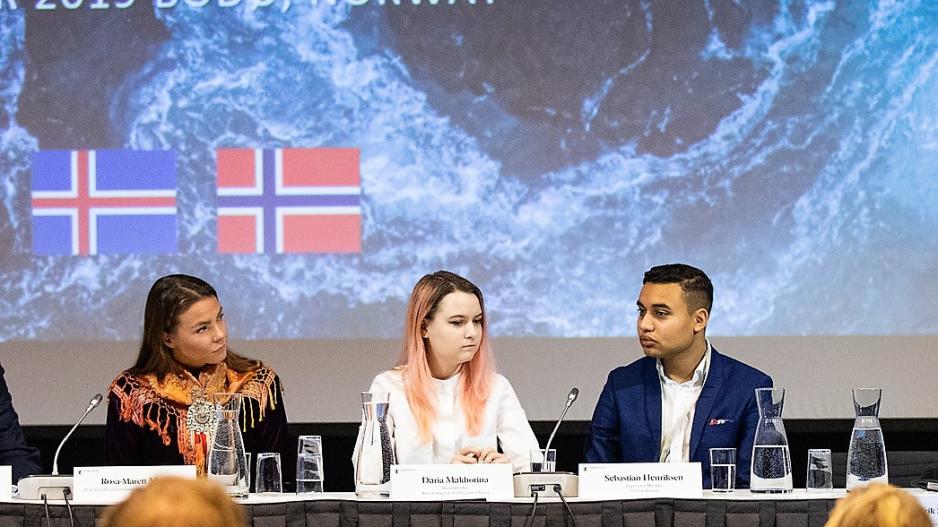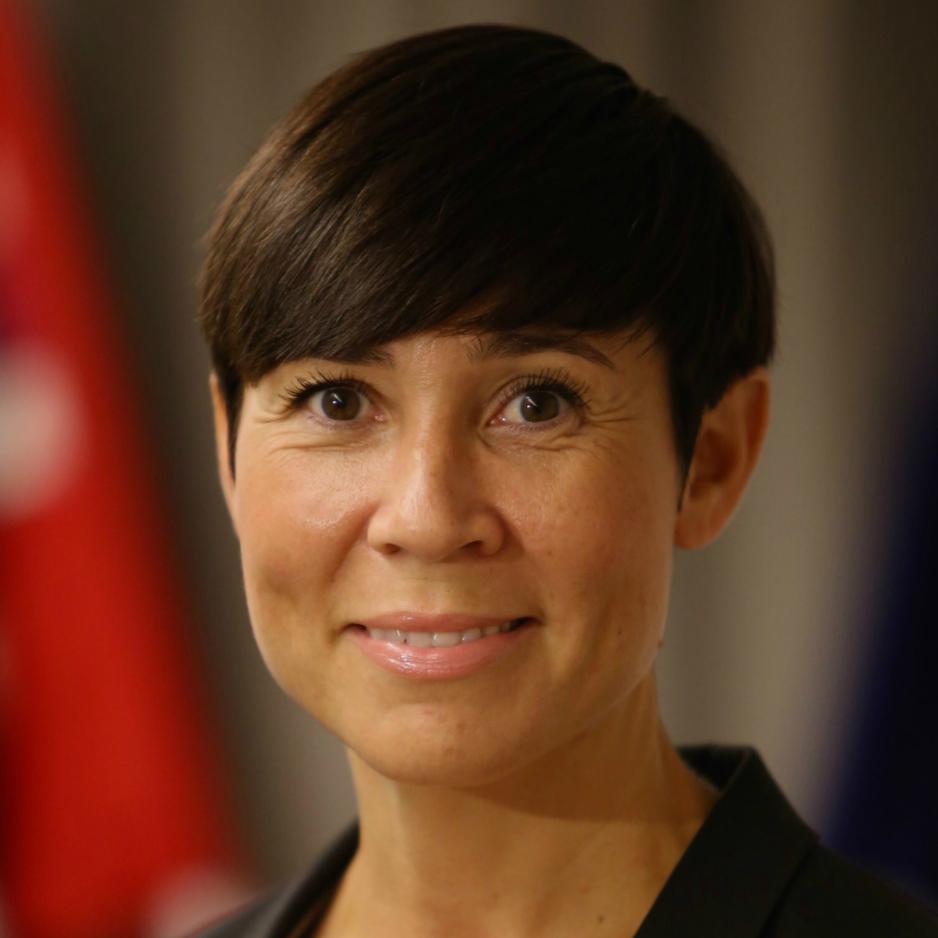Barents Council High-Level Meeting: “More Difficult to Be Young in the Arctic During the Pandemic”

Norwegian Foreign Minister Ine Eriksen Søreide, Swedish Head of West Bothnia County Helene Hellmark Knutsson and Daria Makhotina from the Barents Youth Council discuss living conditions and equality for youth in the Barents region. (Screen dump from Barents Council meeting 27 October 2020)
During the Corona pandemic, people who live in remote and desolate places grow more isolated than before. “It is mentally challenging”, says Daria Makhotina of the Barents Youth Council. During a high-level meeting of the Barents Council, Foreign Minister Ine Eriksen Søreide says youth is a particular area of effort for the Barents cooperation.
On Monday 26 October, Norwegian Foreign Minister Ine Eriksen Søreide hosted a digital high-level Barents meeting together with the head of West Bothnia County in Sweden Helene Hellmark Knutsson, who chairs Barents Regional Council.
“We must continue developing and strengthening cooperation despite challenges presented by the Corona pandemic”, says Foreign Minister Eriksen Søreide.
The meeting focused on developing and strengthening the Barents cooperation during and after the pandemic. Among the issues discussed were digitalization, health, youth, infrastructure, sustainability, and funding.
Contact is extra important
“We are focused on listening to actors in the region and being closely in touch with youth, indigenous people, Barents Council working groups and the regions. Cross-border contact between people in the north is at the core of Barents cooperation, says Eriksen Søreide.
“Supporting the Barents cooperation now that the Pandemic is placing restrictions on the opportunities to meet is extra important.”
Russian Daria Makhotina from the Barents Youth Council was amongst the panelists. She pointed out the importance of focusing on mental health during the pandemic.
“We who live in the Barents region are used to being isolated due to weather and distances. However, the pandemic has made it even more difficult. Life in complete isolation is hard on mental health”, says Makhotina, a Murmansk resident.
Mostly digital
How is dialogue with Barents youth maintained during the pandemic?
“Activities are now mostly digital. Internally on the Norwegian side we do have some in-person meetings when possible, but we too have mostly digital interaction”, says Ine Eriksen Søreide in an email to High North News.
She says the chairmanship team remains in touch with the Barents Regional Youth Council (BRYC), as well as with young people on the Norwegian side who are part of the Barents cooperation. There is also some dialogue with the Norwegian Barents Secretariat about this.
Want to be heard and included
“During the chairmanship, there is also an initiative for youth through the programme “Children and Youth at Risk”. Young entrepreneurship is also a special initiative area. Young entrepreneurs are tho participate and share their experiences in the scheduled expert meeting for e-health on 8 December”, the Foreign Minister says.
The population in the Barents region deserves to live and work in a modern society.
In her video greeting to the project actors during the recent Barents Secretariat project manager conference, the foreign minister pointed in particular to the young. The government maintains its focus on the youth in a broader High North context too.
The work with the youth panel of the upcoming whitepaper on the High North is led by the Ministry of Foreign Affairs and the Barents cooperation is stressed in the dialogue with many of the youth here.

“The pandemic has made everything more difficult”, says Daria Makhotina (center). Here from the Northern Dimension’s MP forum last year, together with Sebastian Henriksen and Rosa-Marne Magga from Enontekio. (Photo: Stortinget/The Norwegian Parliament)
“We are ready to work for our future, but we first have to be included in the dialogue”, is the crystal-clear message from Daria Makhotina.
Wants a larger role for indigenous people
Another aspect of the Barents Council’s work is about involving indigenous people. How are they heard through the isolation?
“The Chairmanship is in close dialogue with the indigenous people working group and the Sami parliament about the Barents cooperation, in particular via digital platforms between the regions during the pandemic, where indigenous people also participate. During the crisis, many find support in their colleagues in the other Barents countries. This goes for indigenous people too. We will organize an indigenous people high-level meeting in cooperation with the indigenous people working group during our chairmanship period, says Eriksen Søreide.
Piera Heaika Muotka of the working group for indigenous people (WGIP) at the Barents cooperation wants a greater role for indigenous people when it comes to decisions that applies to them.
“Digital platforms are important for the survival of indigenous people’s language, in particular since all our languages are red-listed”, says Muotka.
He asks the Barents Council to include representatives from indigenous people in the Council’s decision-making processes.
Women leave
Head of West Bothnia county in Sweden and Chair of the Barents Regional Council Helene Hellmark Knutsson expressed particular concerns regarding young women’s choice to leave the Barents region for larger cities further south.
“Young people, in particular women, migrate out from the region. We must make it more attractive for women to live and work in the High North. Then men will follow and they will stay”, Knutsson says.
How can life in Arctic be made more attractive for women, Ine Eriksen Søreide?
“The header for our chairmanship is ‘A strong and vital Barents Region’. The Barents countries have a joint interest in supporting strong communities in the north, where people want to work and live. This is also key in the government’s Arctic policy and a key issue of the upcoming whitepaper on the High North”, the foreign minister says.
“Competence and attractive living through having a variety of leisure activities on offer as well as making an effort for business are key in keeping the young, women included. In our work with the Barents chairmanship and the [upcoming] whitepaper on the High North I have met many strong, great young women from the High North. The demographic trends with youth moving to the cities is found all over the world", Eriksen Søreide says.
She adds that the government has chosen to listen to the young in order to conduct an Arctic policy that is as much on the mark as possible.
Strengthened cooperation
How has the pandemic affected the Barents cooperation?
“Of course, the pandemic creates challenges for further development in a form of cooperation that is based on cross-border contact between people. At the same time, we notice that friendships and cooperation built through years is a strength during times like these”, Eriksen Søreide says.
She is impressed with the creativity that can currently be observed.
New projects lined up
“It is in difficulties like these we really comprehend the extent of contact that normally takes place across borders in the North. Dialogue and contact are maintained, even if physical meetings are put on hold. The working groups on national and regional level continue working in various areas, and this is an important part of the ongoing work in the Barents region. The counties, the Sami Parliament (Sametinget) and the Barents Secretariat also do a great job with maintaining contact”, she says.
The foreign ministers thinks that when things get back to normal again, many will be ready to start up new projects and cooperation in a variety of sectors.
“Norway is working to establish a funding mechanism under the Barents Council. This will strengthen the substance of the Barents cooperation and support the working groups’ important activity.”
Shorter distances
During the digital meeting of the Barents Council, it was also stressed that using digital solutions also contributes to minimizing geographical distances. Not having to travel far may both save time and money.
“We have observed that this may provide better participation at Barents meetings due to the threshold for participating being lowered.”
What will the future focus areas of the Barents Council be?
“During its chairmanship, Norway will continue its focus on the priorities of health, people-to-people, and knowledge. Youth is a key area, and we are in dialogue with the regions about it. We have also allocated NOK 30 million to research in the Barents region through the Norwegian Research Council, and we maintain our work on e-health. The Barents Climate Action plan will be updated, and we also focus on sustainable business activity, amongst others through young entrepreneurship. Digital solutions and infrastructure as well as culture and efforts in forestry are other important areas, Foreign Minister Ine Eriksen Søreide says in closing.
Norway wants to add weight to the dialogue between the regional council and the Barents Council, and therefore the two council leaders held a high-level meeting for the first time ever. Russia, Sweden, Finland, Iceland, Denmark and the EU attended the meeting, as did regional representatives.
Norway has held the chairmanship of the Barents Council since 2019 and will keep it until 2021. The headline of its work has been a strong and vital Barents region, with health, people-to-people and knowledge as key themes. In November 2019, Norway organized the first-ever Barents health high-level meeting, which is to be followed up with an expert meeting about e-health on 8 December this year. At that meeting, the foreign minister will also raise the need for strengthened digital health solutions.
This article was originally published in Norwegian and has been translated by HNN's Elisabeth Bergquist.




